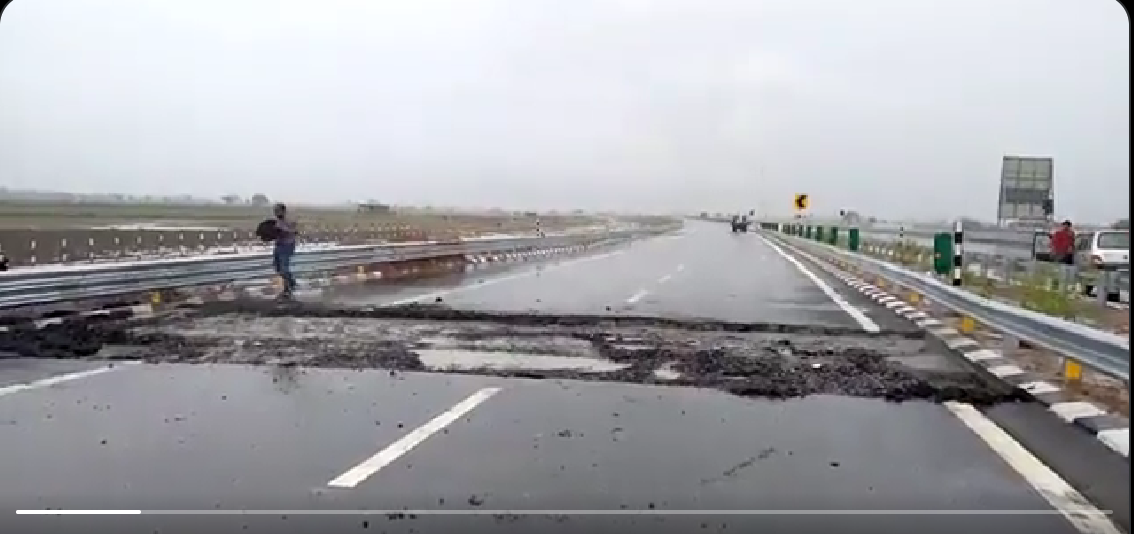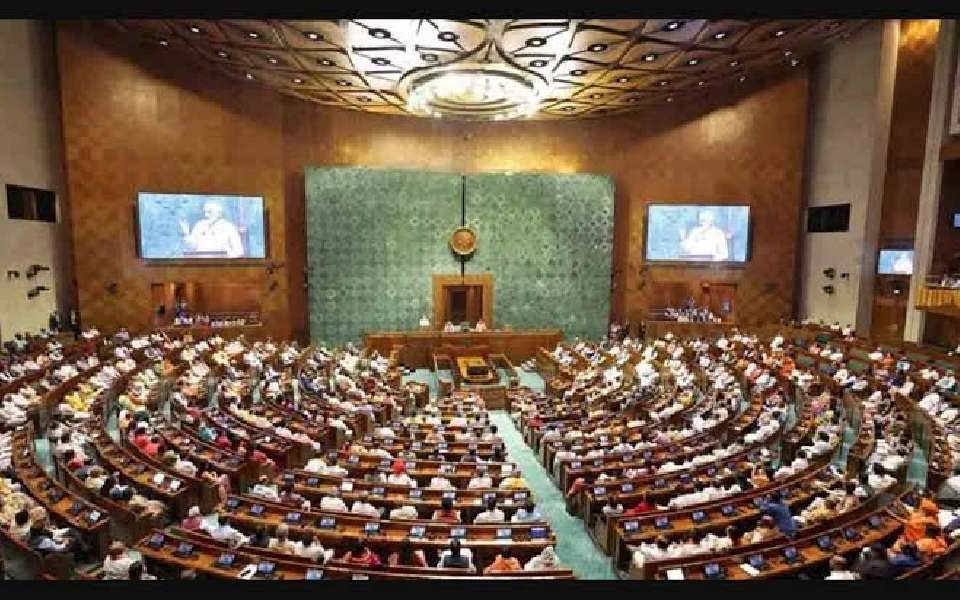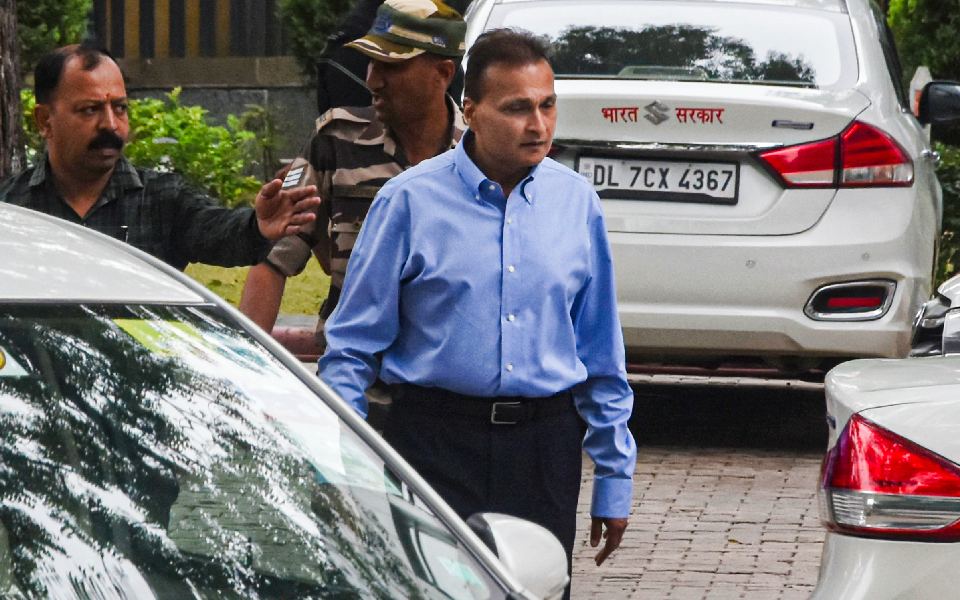Jalaun (UP), Jul 21: A portion of the Bundelkhand expressway developed deep potholes due to heavy rains here, within a week of Prime Minister Narendra Modi inaugurating the 296-km-long road.
The portion of the road developed one-and-a-half-foot-deep potholes due to rains at Chiriya Salempur in Uttar Pradesh's Jalaun district on Wednesday night, said UP Expressway Industrial Authority spokesperson Durgesh Upadhyay.
The potholes were repaired instantly and the road opened to traffic, he added.
The authority deployed a team with bulldozers and necessary equipment to repair the stretch.
The incident gave ammunition to the opposition Samajwadi Party and the Congress to attack the government.
On the day of inauguration of the Bundelkhand expressway, Samajwadi Party president Akhilesh Yadav had attacked the Yogi Adityanath government alleging corruption in the "half-finished" project.
PM Modi had inaugurated the 296-km-long expressway on July 16.
When contacted by PTI, District Magistrate Chandani Singh did not respond to calls.
Samajwadi Party chief Akhilesh Yadav in a Hindi tweet said, "This is a sample of the quality of the BJP's half-finished development. The Bundelkhand expressway was inaugurated by big people and within a week huge pits of corruption came out on it. It is good that the runway was not built on it."
"The caving-in of the Bundelkhand expressway just days after its inauguration proves corruption of the double engine BJP government in the construction of the road. The CM should apologise for endangering lives of people by inaugurating half-finished Bundelkhand expressway," the Samajwadi Party said in a Hindi tweet and also tagged a video.
The UP Congress also targeted the BJP government on Twitter, saying the government had promised pothole-free roads. The development has taken a hit after four days of inauguration of the Bundelkhand expressway, it said.
बुंदेलखंड एक्सप्रेसवे का एक हिस्सा धंस गया.
— Ranvijay Singh (@ranvijaylive) July 21, 2022
सिर्फ 4 दिन पहले PM ने उद्घाटन किया था. pic.twitter.com/eBBuMOcIiT
Tomorrow, 16th July is a special day for my sisters and brothers of the Bundelkhand region. At a programme in Jalaun district, the Bundelkhand Expressway will be inaugurated. This project will boost the local economy and connectivity. https://t.co/wYy4pRQgx4 pic.twitter.com/Y2liHsxE5U
— Narendra Modi (@narendramodi) July 15, 2022
Let the Truth be known. If you read VB and like VB, please be a VB Supporter and Help us deliver the Truth to one and all.
Moscow, Aug 5 (AP): Russia has declared that it no longer considers itself bound by a self-imposed moratorium on the deployment of nuclear-capable intermediate range missiles, a warning that potentially sets the stage for a new arms race as tensions between Moscow and Washington rise again over Ukraine.
In a statement Monday, the Russian Foreign Ministry linked the decision to efforts by the US and its allies to develop intermediate range weapons and preparations for their deployment in Europe and other parts of the world. It specifically cited US plans to deploy Typhoon and Dark Eagle missiles in Germany starting next year.
The ministry noted that such actions by the US and its allies create “destabilising missile potentials" near Russia, creating a "direct threat to the security of our country” and carry “significant harmful consequences for regional and global stability, including a dangerous escalation of tensions between nuclear powers.”
It didn't say what specific moves the Kremlin might take, but President Vladimir Putin has previously announced that Moscow was planning to deploy its new Oreshnik missiles on the territory of its neighbour and ally Belarus later this year.
“Decisions on specific parameters of response measures will be made by the leadership of the Russian Federation based on an interdepartmental analysis of the scale of deployment of American and other Western land-based intermediate-range missiles, as well as the development of the overall situation in the area of international security and strategic stability,” the Foreign Ministry said.
The Russian statement follows President Donald Trump's announcement Friday that he's ordering the repositioning of two US nuclear submarines “based on the highly provocative statements” of Dmitry Medvedev, who was president in 2008-12 to allow Putin, bound by term limits, to later return to the office. Trump's statement came as his deadline for the Kremlin to reach a peace deal in Ukraine approaches later this week.
Trump said he was alarmed by Medvedev's attitude. Medvedev, who serves as deputy chairman of Russia's Security Council chaired by Putin, has apparently sought to curry favor with his mentor by making provocative statements and frequently lobbing nuclear threats. Last week. he responded to Trump's deadline for Russia to accept a peace deal in Ukraine or face sanctions by warning him against “playing the ultimatum game with Russia” and declaring that “each new ultimatum is a threat and a step toward war.”
Medvedev also commented on the Foreign Ministry's statement, describing Moscow's withdrawal from the moratorium as “the result of NATO countries' anti-Russian policy.”
“This is a new reality all our opponents will have to reckon with,” he wrote on X. “Expect further steps.”
Intermediate-range missiles can fly between 500 to 5,500 kilometers (310 to 3,400 miles). Such land-based weapons were banned under the 1987 Intermediate-range Nuclear Forces (INF) Treaty. Washington and Moscow abandoned the pact in 2019, accusing each other of violations, but Moscow declared its self-imposed moratorium on their deployment until the US makes such a move.
The collapse of the INF Treaty has stoked fears of a replay of a Cold War-era European missile crisis, when the US and the Soviet Union both deployed intermediate-range missiles on the continent in the 1980s. Such weapons are seen as particularly destabilising because they take less time to reach targets, compared with intercontinental ballistic missiles, leaving no time for decision-makers and raising the likelihood of a global nuclear conflict over a false launch warning.
Russia's missile forces chief has declared that the new Oreshnik intermediate range missile, which Russia first used against Ukraine in November, has a range to reach all of Europe. Oreshnik can carry conventional or nuclear warheads.
Putin has praised the Oreshnik's capabilities, saying its multiple warheads that plunge to a target at speeds up to Mach 10 are immune to being intercepted and are so powerful that the use of several of them in one conventional strike could be as devastating as a nuclear attack.
Putin has warned the West that Moscow could use it against Ukraine's NATO allies who allowed Kyiv to use their longer-range missiles to strike inside Russia.





